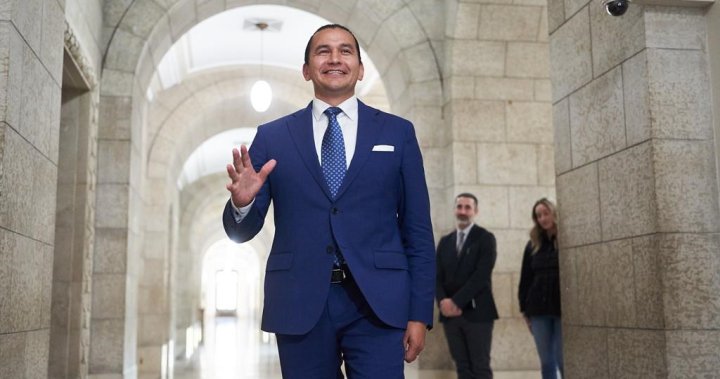Manitoba Premier Wab Kinew says he wants work with Ottawa on re-examining how carbon pricing is applied in the province but did not share specific details on what that may look like.
“I think that Manitoba has a very strong case to make that the carbon price could be revisited here in our province, and we’re going to be having those conversations with the same sort of constructive, collaborative tone that we’re bringing for this exciting investment today,” Kinew said at a clean aviation fuel announcement in Winnipeg.
The announcement was done alongside federal Energy and Natural Resource Minister Jonathan Wilkinson.
Kinew did not say whether revisiting the policy means he wants to see the $65 per tonne carbon price be adjusted in his province or if this means Manitoba plans on creating its own pricing system.
The federal carbon price will increase to $80 per tonne on April 1. For gasoline, this would mean the carbon price grows from about 14 cents per litre to 17 cents a litre.

British Columbia, the Northwest Territories and Quebec all have their own pollution pricing plans that take the place of the federal backstop, which applies in all regions without a plan that meets federal standards.
Get the latest National news.
Sent to your email, every day.
This comes after Kinew said Manitoba has a “strong case” to review the federal carbon price’s application in his province on the Jan. 7 episode of The West Block.
“I think that there’s an argument that Manitoba is maybe one of the strongest cases you could make, that the price on carbon should be revisited in our jurisdiction. It’s definitely something that I know Manitobans would like to see some help with,” Kinew told The West Block host Mercedes Stephenson in that interview.
The premier emphasized the fact Manitoba’s electricity grid comes almost entirely from renewable sources. According to Manitoba Hydro, 97 per cent of the province’s electricity is generated by hydroelectricity. However, 60 per cent of home heating is done with carbon emitting natural gas.

For his part, Wilkinson referenced a report from University of Calgary economists Trevor Tombe and Jennifer Winter saying the carbon price is not a major cost of living driver.
The minister then talked about rebates households receive where the federal carbon price is in effect.
“So getting rid of the price on pollution actually would work in reverse order to affordability. It would actually make poorer people poorer because they receive more money than they actually pay,” Kinew said.
The carbon price has been under renewed scrutiny from provinces after Ottawa issued a three-year pause on the carbon price for home heating oil. While this is a national program, critics have said it disproportionately benefits those in Atlantic Canada where home heating oil is widely used.
In the Northwest Territories, Premier R.J. Simpson has called for a carbon price exemption for the territory’s residents, citing the high cost of living. While the territory does have its own pricing system, it still must match or exceed the federal backstop in order for it to be removed.
Saskatchewan Premier Scott Moe has instructed Crown utility SaskEnergy to stop collecting the carbon price on home heating, which began on Jan. 1.
“I would also say to some provinces and territories, if they actually have an interest in designing their own plan, that would reach the criteria that are established by the federal government, they are welcome to do that,” Wilkinson said.
Prime Minister Justin Trudeau and his cabinet ministers have said numerous times over the past few months that there will be no more carve outs to the federal carbon price.
© 2024 Global News, a division of Corus Entertainment Inc.




